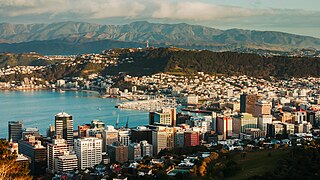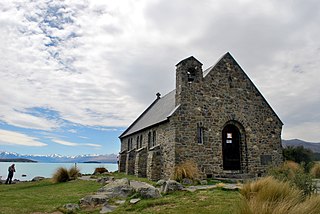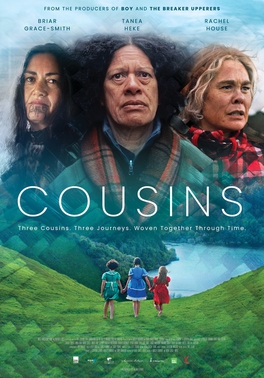Related Research Articles

Wellington is the capital city of New Zealand. It is located at the south-western tip of the North Island, between Cook Strait and the Remutaka Range. Wellington is the third-largest city in New Zealand, and is the administrative centre of the Wellington Region. It is the world's southernmost capital of a sovereign state. Wellington features a temperate maritime climate, and is the world's windiest city by average wind speed.

The Chatham Islands are an archipelago in the Pacific Ocean about 800 km (430 nmi) east of New Zealand's South Island. They are administered as part of New Zealand. The archipelago consists of about 10 islands within an approximate 60 km (30 nmi) radius, the largest of which are Chatham Island and Pitt Island (Rangiauria). They include New Zealand's easternmost point, the Forty-Fours. Some of the islands, formerly cleared for farming, are now preserved as nature reserves to conserve some of the unique flora and fauna.

Georgina Beyer was a New Zealand Labour Party politician who represented Wairarapa in the Parliament of New Zealand from 1999 to 2005, after serving as mayor of Carterton from 1995 to 1999. Beyer was the world's first openly transgender mayor, and the world's first openly transgender member of parliament. As a member of the Labour Party Beyer supported progressive policies including prostitution law reform, civil unions, anti-discrimination laws, and the promotion of Māori rights. She resigned in 2007, and, in 2014, unsuccessfully stood for election on behalf of the Mana Party.

Michael King was a New Zealand historian, author, and biographer. He wrote or edited over 30 books on New Zealand topics, including the best-selling Penguin History of New Zealand, which was the most popular New Zealand book of 2004.

James Edward FitzGerald was a New Zealand politician. According to some historians, he should be considered the country's first premier, although a more conventional view is that neither he nor his successor should properly be given that title. He was a notable campaigner for New Zealand self-governance. He was the first Superintendent of the Canterbury Province.

Patricia Frances Grace is a New Zealand writer of novels, short stories, and children's books. She began writing as a young adult, while working as a teacher. Her early short stories were published in magazines, leading to her becoming the first female Māori writer to publish a collection of short stories, Waiariki, in 1975. Her first novel, Mutuwhenua: The Moon Sleeps, followed in 1978.

Cliff Curtis is a New Zealand actor. His film credits include Once Were Warriors (1994), Three Kings (1999), Blow (2001), Training Day (2001), Whale Rider (2002), Collateral Damage (2002), Sunshine, Live Free or Die Hard, Push, Crossing Over, Colombiana (2011), The Dark Horse (2014), for which he won the Asia Pacific Screen Award for Best Performance by an Actor, and Doctor Sleep (2019), also portraying James "Mac" Mackreides in The Meg (2018) and Meg 2: The Trench (2023) and Tonowari in Avatar: The Way of Water (2022) and Avatar 3 (2025). Curtis had television series roles on NBC's Trauma and ABC's Body of Proof and Missing. From 2015 to 2017, he portrayed Travis Manawa on the AMC horror drama series Fear the Walking Dead.
New Zealand Māori rugby league team is a rugby league representative side made up of New Zealand Māori players. The side represents the New Zealand Māori Rugby league. Like its union counterpart, the rugby league team previously competed in international competitions.

Tāme Wairere Iti is a New Zealand Māori activist, artist, actor and social worker. Of Ngāi Tūhoe descent, Iti rose to prominence as a member of the protest group Ngā Tamatoa in 1970s Auckland, becoming a key figure of the Māori protest movement and the Māori renaissance. Since then, he has become a renowned activist for the rights of Māori and the process of co-governance and decolonisation.
The following lists events that happened during 1937 in New Zealand.
Tungia Dorothea Gloria Baker was a New Zealand actor, weaver, and administrator. Her notable acting roles included Ngahuia in the 1980s television drama Open House and Hira in the 1993 film The Piano. Baker was influential in contemporary Māori theatre, Māori film making and Māori arts. She named the Taki Rua Theatre, and was a founding member of Māori artists' collectives Te Manu Aute and Haeata.

Christianity in New Zealand dates to the arrival of missionaries from the Church Missionary Society who were welcomed onto the beach at Rangihoua Bay in December 1814. It soon became the predominant belief amongst the indigenous people, with over half of Māori regularly attending church services within the first 30 years. Christianity remains New Zealand's largest religious group, but no one denomination is dominant and there is no official state church. According to the 2018 census 37.3% of the population identified as Christian. The largest Christian groups are Anglican, Catholic and Presbyterian. Christian organisations are the leading non-government providers of social services in New Zealand.

Eleanor Catton is a New Zealand novelist and screenwriter. Born in Canada, Catton moved to New Zealand as a child and grew up in Christchurch. She completed a master's degree in creative writing at the International Institute of Modern Letters. Her award-winning debut novel, The Rehearsal, written as her Master's thesis, was published in 2008, and has been adapted into a 2016 film of the same name. Her second novel, The Luminaries, won the 2013 Booker Prize, making Catton the youngest author ever to win the prize and only the second New Zealander. It was subsequently adapted into a television miniseries, with Catton as screenwriter. In 2023, she was named on the Granta Best of Young British Novelists list.

Eugenie Meryl Sage is a New Zealand environmentalist and former politician. She was a Green Party Member of Parliament in the New Zealand House of Representatives from 2011 to 2023.

Joe Hudson is a fictional character on the New Zealand soap opera Shortland Street who was portrayed by Rawiri Paratene from 2001 to 2002.

Rachel Jessica Te Ao Maarama House is a New Zealand actress and director. She has received numerous accolades including an Arts Laureate, NZ Order of Merit, 'Mana Wahine' from WIFT NZ and Te Waipuna a Rangi for her contributions as an actor and director.
Alexander Tarrant-Keepa, known professionally as Alex Tarrant, is a New Zealand actor. With multiple TV and film credits, he currently portrays Kai Holman in the CBS action crime drama NCIS: Hawaiʻi and Valandil on Amazon Prime's The Lord of the Rings: The Rings of Power fantasy drama.

Cousins is a 2021 New Zealand film directed by Ainsley Gardiner and Briar Grace-Smith. It is an adaptation of the 1992 novel of the same name by Patricia Grace.
The following lists events that happened during 2022 in New Zealand.

Tama William Potaka is a New Zealand politician and Member of Parliament in the House of Representatives representing the Hamilton West electorate. He is a member of the National Party and was chief executive of Ngāi Tai ki Tāmaki before entering Parliament.
References
- 1 2 3 4 5 6 7 8 9 10 "Children's adventure on a grand scale". The Press . 28 March 2006. ProQuest 314764542.
- 1 2 Signal, Erin (14 January 2006). "What are you lookin' at?". The Press . ProQuest 314734258.
- ↑ Drinnan, John (11 September 2005). "Kiwis get juiced up on locally made drama". Variety . Archived from the original on 2 July 2023. Retrieved 2 July 2023.
- ↑ "NZ land wars TV drama for children". The New Zealand Herald . 13 March 2005. Archived from the original on 2 July 2023. Retrieved 2 July 2023.
- 1 2 3 4 5 Chalmers, Anna (12 July 2005). "Cold, wet and lost in a film shoot". The Dominion Post . ProQuest 338193644.
- ↑ Hill, Rebecca Barry (26 March 2006). "Entertainment picks: Love in the world's coldest climate". The New Zealand Herald . Archived from the original on 2 July 2023. Retrieved 2 July 2023.
- ↑ "Search out lost kids". Sunday Herald . 29 July 2007. ProQuest 360757368. Archived from the original on 2 July 2023. Retrieved 2 July 2023.
- ↑ Grant, Frances (5 April 2006). "Frances Grant: Lost in the wilderness". The New Zealand Herald . Archived from the original on 2 July 2023. Retrieved 2 July 2023.